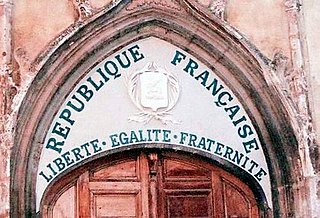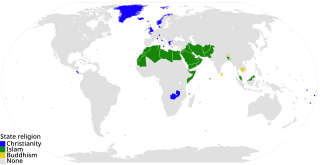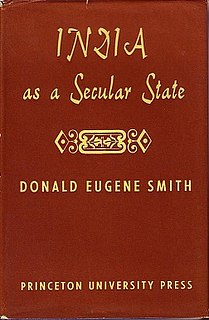| Look up secular in Wiktionary, the free dictionary. |
Secular is an adjective describing something separate from religion.
Contents
Secular may also refer to:
| Look up secular in Wiktionary, the free dictionary. |
Secular is an adjective describing something separate from religion.
Secular may also refer to:
| This disambiguation page lists articles associated with the title Secular. If an internal link led you here, you may wish to change the link to point directly to the intended article. |
Secularism, as defined in the Merriam-Webster dictionary, is "indifference to, or rejection or exclusion of, religion and religious considerations". In certain contexts, the word can connote anticlericalism, atheism, desire to exclude religion from social activities or civic affairs, banishment of religious symbols from the public sphere, state neutrality toward religion, the separation of religion from state, or disestablishment.
In the Indian context, the term pseudo-secularism is used to pejoratively describe policies considered to involve minority appeasement. The Hindus form the majority religious community in India; the term "pseudo-secular" implies that those who claim to be secular are actually not so, but are anti-Hindu or pro-minority. The Hindu nationalist politicians accused of being "communal" use it as a counter-accusation against their critics.
In sociology, secularization is the transformation of a society from close identification with religious values and institutions toward nonreligious values and secular institutions. The secularization thesis expresses to the idea that as societies progress, particularly through modernization and rationalization, religious authority diminishes in all aspects of social life and governance. The term "secularization" may also occur in the context of the lifting of monastic restrictions from a member of the clergy.
Secularity is the state of being separate from religion, or of not being exclusively allied with or against any particular religion.

Secularism is a constitutional principle of France. Article 1 of the French Constitution is commonly interpreted as discouraging religious involvement in government affairs, especially religious influence in the determination of state policies; it also forbids government involvement in religious affairs, and especially prohibits government influence in the determination of religion. Secularism in France does not preclude a right to the free exercise of religion.

Islam is the most practiced religion in the country. The established presence of Islam in the region that now constitutes modern Turkey dates back to the latter half of the 11th century, when the Seljuks started expanding into eastern Anatolia.

A secular state is an idea pertaining to secularity, whereby a state is or purports to be officially neutral in matters of religion, supporting neither religion nor irreligion. A secular state also claims to treat all its citizens equally regardless of religion, and claims to avoid preferential treatment for a citizen based on their religious beliefs, affiliation or lack of either over those with other profiles.

Olivier Roy is a French political scientist, professor at the European University Institute in Florence, Italy. He has published articles and books on secularisation and Islam including "Global Islam", and The Failure of Political Islam. He is known to have "a different view of radical Islam" than some other experts, seeing it as peripheral, Westernized and part of a radicalized and "virtual" rather than pious and "actual" Muslim community. More recently he has written on the Charlie Hebdo shooting, and the November 2015 Paris attacks.
Secular spirituality is the adherence to a spiritual philosophy without adherence to a religion. Secular spirituality emphasizes the personal growth and inner peace of the individual, rather than a relationship with the divine. Secular spirituality is made up of the search for meaning outside of a religious institution; it considers one's relationship with the self, others, nature, and whatever else one considers to be the ultimate. Often, the goal of secular spirituality is living happily and/or helping others.
The secular variation of a time series is its long-term non-periodic variation. Whether something is perceived as a secular variation or not depends on the available timescale: a secular variation over a time scale of centuries may be part of a periodic variation over a time scale of millions of years. Natural quantities often have both periodic and secular variations. Secular variation is sometimes called secular trend or secular drift when the emphasis is on a linear long-term trend.
Secular theology rejects the substance dualism of modern religion, the belief in two forms of reality required by the belief in heaven, hell, and the afterlife. Secular theology can accommodate a belief in God--as many nature religions do--but as residing in this world and not separately from it.
Jewish secularism comprises the non-religious ethnic Jewish people and the body of work produced by them. Among secular Jews, traditional Jewish holidays may be celebrated as historical and nature festivals, while life-cycle events, such as births, marriages, and deaths, may be marked in a secular manner.

Secularism has been a controversial concept in Islamic political thought, owing in part to historical factors and in part to the ambiguity of the concept itself. In the Muslim world, the notion has acquired strong negative connotations due to its association with removal of Islamic influences from the legal and political spheres under foreign colonial domination, as well as attempts to restrict public religious expression by some secularist nation states. Thus, secularism has often been perceived as a foreign ideology imposed by invaders and perpetuated by post-colonial ruling elites, and understood as equivalent to irreligion or anti-religion.
Postsecularism refers to a range of theories regarding the persistence or resurgence of religious beliefs or practices in the present. The "post-" may refer to after the end of secularism or after the beginning of secularism.

The Institute for the Study of Secularism in Society and Culture (ISSSC) is located at Trinity College in Hartford, Connecticut. ISSSC was established in 2005 to advance the understanding of the role of secular values and the process of secularization in contemporary society and culture. Designed to be multidisciplinary and nonpartisan, the Institute conducts research, lectures and public events.

The secularization process in Lebanon began under a 1920s French mandate, continuing under different governments since independence. Lebanon is a parliamentary democracy within an overall confessionalist framework; as a form of consociationalism, the highest offices are proportionately reserved for representatives from certain religious communities.
Secularism is one of the four fundamental principles according to the original 1972 Constitution of Bangladesh. The secularism principle was removed from the constitution in 1977 by Ziaur Rahman, replaced with a statement of "absolute trust and faith in Almighty Allah", and Islam was declared the state religion in 1988. In 2010, the Bangladesh Supreme Court stated Islam remained the state religion. Over 90% of Bangladeshis are Muslims, the rest being Hindus 8%, Buddhists 1%, Christians 0.9%, and others 0.1%. People in Bangladesh observe various secular festivals at different times throughout the year. The ethos of secularism in South Asia is in many ways different from that of Western versions that assert complete separation of church and state. Rather, it is the freedom of individuals to practice the faith he or she desires without being subject to any form of state or communal discrimination.
Secular liberalism is a form of liberalism in which secularist principles and values, and sometimes non-religious ethics, are especially emphasised. It supports the separation of religion and state. Moreover, secular liberals are usually advocates of liberal democracy and the open society as models for organising stable and peaceful societies.
Secularism in Tunisia is an ideological and political movement aiming at defining the relationship between religion and state and the place of religion in society during an ongoing modernization. The Tunisian Constitution of 2014 affirmed Tunisia as a civil state founded on citizenship. It also declared Islam as Tunisia's religion. The following religious festivals are recognized as national holidays: the Islamic New Year, the birth of the Prophet Muhammad, Eid al-Fitr, and Eid al-Adha.

India as a Secular State is a book written by Donald Eugene Smith and published by Princeton University Press in 1963.